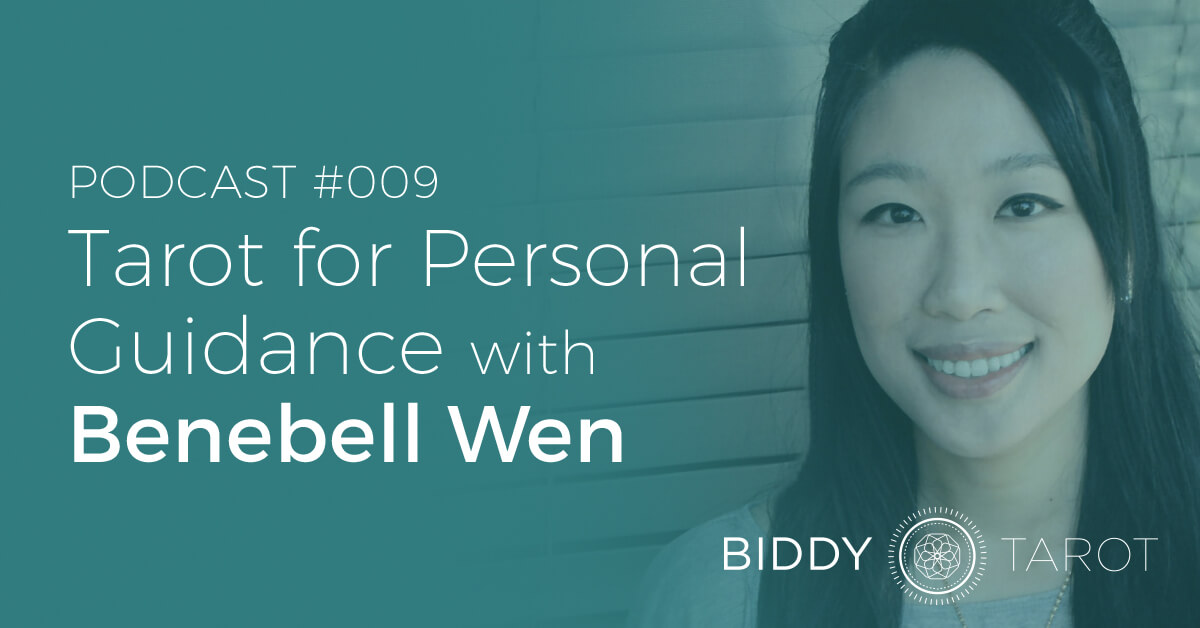
One of the most powerful uses of the Tarot is as a tool for personal – and Divine – guidance. The rich symbolism within the cards helps us to connect deeply with our inner wisdom and intuition, providing the clarity we need to navigate life's challenges.
So how do we tap into this powerful energy of the Tarot for personal guidance?
Well, that's why I invited my beautiful guest, Benebell Wen, to join us on the Biddy Tarot Podcast. She is one smart lady. When she's not practicing law in her regular day job as an attorney, she's busy blending tarot, Feng shui, the I Ching, numerology, and Chinese and Hellenistic astrology in her spiritual practice. She is also the author of the quintessential Tarot book, “Holistic Tarot: An Integrative Approach to Using Tarot for Personal Growth”.
In this episode, Benebell and I discuss:
- The ins and outs of being a Tarot reader AND a corporate lawyer
- How to blend the left and right brain to master the art of Tarot
- What ‘divination' really means in a Tarot reading
- Why it's essential to ground yourself before a reading
- The exact techniques Benebell uses to gain personal insight from the Tarot cards
And so much more! Let's go…
[Tweet “Here's how to connect with your intuition with #Tarot as your guide https://biddytarot.com/admin/9 @tarotanalysis @biddytarot”]Additional Resources:
Podcast Transcript
Brigit: You’re listening to the Biddy Tarot Podcast, and this is Episode 9: Tarot for Personal Guidance with Benebell Wen.
Voice-over
Welcome to the Biddy Tarot podcast, where you will learn how to connect more deeply with your intuition and live an empowered and enlightened life with the Tarot cards as your guide.
Listen as Brigit and her guests share their very best tips and strategies to help you read Tarot with confidence.
And now, here is your host Brigit Esselmont.
Introduction
Hello and welcome!
One of the most powerful uses of the Tarot is as a tool for personal and Divine guidance.
The rich symbolism within the cards helps us to connect deeply with our inner wisdom and intuition, providing the clarity we need to navigate life's challenges.
So, how do we tap into this powerful energy of the Tarot for personal guidance?
Well, that's why I invited my beautiful guest today to join us on the Biddy Tarot Podcast.
This is one smart lady. When she's not practicing law in her regular day job as an attorney, she's busy blending Tarot, Feng-shui, the I Ching, Numerology, and Chinese and Hellenistic Astrology in her spiritual practice.
You may know her best as the author of Holistic Tarot: An Integrative Approach to Using Tarot for Personal Growth.
She is none other than the gorgeous, Benebell Wen!
Welcome, Benebell!
Benebell Wen: Hi Brigit, one of my favourite Tarot people.
Brigit: Aww.
It’s so good to have you here. I just think we are going to have such a wonderful conversation today, because your brain is like stacked full of knowledge.
It’s insane.
I was – just even having a look back at the Holistic Tarot book and – how many pages is it?
It’s like almost 800, right?
Or even a little bit more….
Benebell Wen: I think it’s about 800 pages.
Brigit: My goodness.
I somehow think you might be somewhat of an over-achiever.
Benebell Wen: Well none of it is original.
It’s all research. I’m just taking from the brightest in the Tarot world, so it’s not really my work.
Brigit: It takes – I think it takes a lot of insight and understanding to be able to bring all of that together in the way that you did.
But, anyway, we’re going to talk a little bit about Holistic Tarot in a second.
I would love to hear about how you got into Tarot, especially as someone who is, you know, working perhaps more of like a traditional job – or a corporate job.
So, how did you find Tarot, or how did Tarot find you?
Benebell Wen: Well as far back as I can remember I’ve been dabbling in metaphysical practices, and my Mum has always been into religion.
So I’ve always had that in my life.
And I’ve been reading Tarot since Junior High – in High School – then a serious study of Tarot began in College and Law School.
I left Tarot and spiritual practices for a while when I got into the practice of Law, but then I was trying to find something. I felt like something was missing in my life, so then I re-visited Tarot and that’s really when I felt like I was coming back full circle.
Brigit: Yeah, and it’s interesting because I think we share a similar path in that I discovered Tarot when I was younger, and then pursued quite a strong corporate career….
Benebell Wen: You did.
Brigit: And I’m always intrigued – like, what do you think sort of pulled you away from Tarot, and then what drew you back?
What do you think it was?
Benebell Wen: I think the need to conform – feeling like you kind of want to, you know, belong to the mainstream, be a little bit more conventional.
And then at some point, when you try too hard to be something that you’re not, you just give up and you go back to what feels more right. And for me that was just Tarot and metaphysical practices.
Brigit: Yeah, absolutely.
And so you know when you are working your day job, do you let people know that you read Tarot, or do you keep it quite segregated?
Benebell Wen: I keep it pretty segregated.
It’s not top, top secret – if that makes any sense.
So I don’t go out of my way to try to keep everything top secret, but I do keep it separate. I don’t talk about what I do in Tarot, or the pseudonym Benebell Wen, at work, unless somebody brings it up first.
And it has happened before. I’ve been “discovered” a couple of times, but by-and-large, nobody in my corporate world knows about what I do.
Brigit: Yeah, and what do you think might happen if they did know?
Benebell Wen: I think it’s more of my own fears than them.
I think there might – for some of them, there might be the initial, “Wow, that seems kind of eccentric for a corporate attorney,” but most people are more wrapped up in their own lives to care too much about what you’re doing.
So I think it’s really just my personal fears.
Brigit: Yeah, and do you think there might be ever a point in the future where you start to bring these two aspects together, or at least be more open between the two?
Benebell Wen: I might be more open if compelled to.
I don’t know if I’d actually bring them together. I do think that there are ethical implications with, you know, bringing together practices like Tarot and the Law, right?
Brigit: Yeah.
Benebell Wen: So they’ll probably stay separate, but, you know, if somebody knows that I do both at some point, then so be it, right?
Brigit: Yeah.
Do you think you’ll ever have Tarot on say a LinkedIn profile?
Benebell Wen: Probably not.
Brigit: I’m just so curious because I was in such a similar place, you know, maybe even just a few years ago, where I wanted to keep the two just so completely separate.
But I just got to a point where – I don’t know – it just felt really exhausting trying to keep the two separate, and almost as if you’re having two parts of yourself.
Like I totally understand and respect why you’d want to keep them separate, but….
Benebell Wen: You’re right though. You’re absolutely right.
It is tiring. It does feel false at times, you know. And every once in a while you just are kind of like, “Wow, why am I keeping up these two faces?”
But every once in a while I get a glimpse of how the corporate world does react to people who are even just religious, you know. Or people who do talk about New Age practices – they roll their eyes; they’re taken less seriously. And already being female, and in ethnic minority, I have enough against me, I don’t need to add New Age eccentricities to that list of things that make me unconventional as a Lawyer.
Brigit: Yeah.
But isn’t it a pity that we can’t be fully expressed, even in the corporate world.
Again, I completely respect and understand why you’re making the choices you are, but wouldn’t it be amazing if we had a world where you could just be completely authentic in who you are. And for that to be acceptable, you know.
I think that’s a dream of mine – that these kinds of – like Tarot, is just something that is so normal, and just like Yoga, or meditation, or something like that.
So maybe that’s a few years to come, but…
Benebell Wen: Right.
Well, you know what’s funny, even as a female attorney I find that I, not hide or conceal, but I do downplay certain attributes that are considered more traditionally feminine – even as an attorney.
Brigit: Yeah.
Benebell Wen: So forget even the Tarot and New Age practices, I don’t even really embrace my femininity in the corporate world.
Brigit: Yeah, that’s fascinating.
And do you ever see a time, like in the future, where you might leave your legal career and go towards a more spiritual path for your source of income?
Benebell Wen: I don’t know.
I think – right now I don’t have children, but I do see if I have children I would see the benefits of that. You know, being able to make my own schedule.
So in the future I might consider that. Right now, I do really enjoy the corporate practice. I do enjoy having, you know, one foot in a more logical based, and rational, plane; and then also having the spiritual development on the other side of my foot.
Brigit: Yeah, I can understand that.
And it’s kind of – it’s nice because I think having the Tarot and more spiritual practices really does help balance out that, I guess, more masculine energy of the corporate world, doesn’t it?
Benebell Wen: It’s improved it.
I mean I’ve been able to trust my intuition more.
I find – I mean I definitely don’t do predictions in the corporate – but I find I just sort of internally, I have a very strong sense of where cases are going to go, or where negotiations are going to go, just because now I’m listening I’m open to my own intuition.
Brigit: Yeah, that’s great.
And, yeah, again, it’s just bringing up flash-backs for me too, because I remember sitting in like meetings and thinking: Yeah, I’m pretty sure I know where these conversations are going!
Because you’re listening on a more intuitive level, and you’re starting to read between the lines – and isn’t that fabulous that we actually can kind of blend these different skills, even though we’re not necessarily being overt about it, it’s nice to bring that into practice?
Benebell Wen: Right.
Brigit: So, you’re a busy Attorney, but somehow you’ve managed to write an 800 page book on Tarot.
So how did this all come about for you?
Benebell Wen: Well I was pursuing the Tarot certification through the Tarot Certification Board of America, back when they still existed.
I just thought it was something fun. I saw in online and I decided to give it a try.
And then, through that, I started teaching Tarot. And to teach you, of course, you have to create a syllabus, and then I started writing out course material. And that slowly fleshed out and merged with my own personal Tarot journals and the research that I’d been keeping over the years.
And so that’s basically how Holistic Tarot blossomed.
Brigit: Yeah, and like how long did it take you to write the book?
Benebell Wen: Well, it’s based largely on notes.
I mean I take comprehensive notes. I just – I write like research papers that nobody has ever seen, you know.
So I put that together – that was through several years in College and Law School. And then, a couple of years ago, I think two or three years, is when I really sat down and I would say non-stop – there were all-nighters – where I put this together – wrote – fleshed-out everything and completed Holistic Tarot in two or three years – in terms of putting all my research together.
Brigit: Yeah, that’s amazing.
Kudos to you!
I don’t think I could have that amount of patience.
Benebell Wen: You have an amazing a book.
And your website’s insane with so much information. I still refer to it.
I still go to your card meanings, so…..
Brigit: Wonderful.
Actually, I was tallying up like how many pages and posts we’ve got – it’s something like crazy – I think there’s about 300 pages, and another 300 posts. It’s kind of nuts!
Benebell Wen: Altogether you have 900 pages of a book too.
Brigit: That’s right – maybe there is.
Benebell Wen: Oh, I’m sure of it.
Brigit: And so tell me a little bit about like Holistic Tarot.
What does that mean for you?
Benebell Wen: Well for me, I was more interested in combining rational based analysis with intuition, and with the signs and symbols of Tarot.
So, I really saw what I was doing more as analytical Tarot, but I guess that was not a very catchy or marketable book title.
So Holistic Tarot became the title that the publisher was really rooting for. And I was like, “Okay, that’s sounds good to me.”
So I went with that, you know.
But in terms of, I guess, trying to sort of stick my approach to Tarot into the term “Holistic Tarot” it really is about, you know, bringing together the left-hemisphere and the right-hemisphere of your brain, and tapping into the unconscious part – the mind – tapping into the intuition through both parts of the brain.
Brigit: Yeah.
I’m a big advocate of that, because I think – I think often times we can go one way or the other.
So, for example, you can end up – I always get these ones incorrect – right brain’s the creative one, isn’t it?
Left brain’s the logical?
Benebell Wen: Yes, correct.
Brigit: I should just remember L Left, L Logical, right?
Benebell Wen: Right.
Brigit: But, you know, we can go like really left brain and start memorising the Tarot card meanings, and trying to over-analyse things; or we can go really right brain, and, you know, maybe not ground it in like the practicalities of life.
So I think it’s really great that you’ve been able to blend those two together.
Do you – like I’m interested – do you ever get sort of push-back by saying, “Tarot’s like a creative thing. It’s not something that you can make analytical or left brain, or so on.”?
Have you ever had any push-back in that sense?
Benebell Wen: Well I agree that it can’t be strictly analytical.
I really see the path of Tarot study in a person, the journey that you take with Tarot, very similar to how you study music.
So every music student – if you play the violin, or the piano – and you’re really serious about it – to the concert level – what you have to do is you always begin with rote learning, rote memorisation, and it’s all about technique and theory, right?
But once you’ve mastered that, and it’s part of your muscle memory, you let go of all conscious knowledge of music and technique and theory, and you really just embrace that creativity, and that spiritual part of music. And that’s where true music is created.
So I really believe Tarot is similar to that.
I think if you don’t have a very strong foundation, it’s hard to build up, you know.
I mean that’s just my personal approach to Tarot. I feel like if you don’t have a strong foundation, that’s based in many different Masters and how they’ve approached Tarot, it’s hard to really, you know, develop higher.
So you need to have that, but then once you have that, you do need to let go of the Masters and find your own meanings.
Brigit: I really like the….
Benebell Wen: So that’s where the intuition….
Brigit: Yeah, the analogy of like learning music – it really resonates.
And I think, you know, you’re right in terms of needing to lay down that foundation, and get in – be able to – I guess it’s memorise to some extent, but, you know, at least get across those traditional card meanings, for example. And then it’s that layering up into the more creative, intuitive space.
And, you know, as you said, like that is where the magic happens.
Benebell Wen: Yeah.
That is definitely where the magic – I think if you’re a – like the first year beginner, in order to just make any progress like I don’t – I can understand how when you take 78 cards and you know nothing about Tarot, how do you even begin?
I don’t know if it’s memorisation, but there is this level of, you know, just study, right?
There’s root study at some point very, very early on, just to get your feet wet, but then, yeah, you need to let go of that once you get to the intermediate level and start trusting your own intuitive abilities.
Brigit: Yeah, and actually I wonder if that’s – I mean the case for, you know you and I, I think we think quite similarly in terms of quite structured and analytical way – I bet there are folks out there who can take very abstract – like very abstract learning processes – and may even be able to pick up Tarot cards without necessarily having the background information.
Benebell Wen: Yeah, definitely.
There’s different – I mean there are different kinds of readers.
And if I can go back to the music analogy, just like there are Folk players, you know, who don’t have any traditional education in music whatsoever – they play sort of – they fiddle – they play by ear, right?
So there’s definitely that approach to Tarot as well.
Brigit: Yeah, absolutely.
And so tell me a little bit about how you like to use Tarot in, either like in your life, or when you’re helping clients.
Benebell Wen: I think my view is actually quite similar to the more, what we call, woo-woo, right?
You know the very sort esoteric, occult, religious views of Tarot.
I think I just have different vocabulary for that.
I do see a part of our unconscious mind connects to this greater collective unconscious – this Divinity, right?
And in that Divinity, you have the answers to everything that you need.
So it’s a matter of tapping into that Divinity, and you can do that through your intuition. And to understand that language, that the sub-conscious and the unconscious parts of your mind speak, we use signs and symbols, archetypical imagery – and that’s where the Tarot comes in.
So a lot of times I think of Tarot as helping myself answer questions that I trust I know the answer to, but I just can access at this point through my conscious memory.
Brigit: I really like that.
6,452 Tarot Enthusiasts Have Already Joined!
Are You Ready To Unlock Your Best Tarot Readings Yet?
Stop the guesswork in your Tarot practice. Discover clarity and confidence in every card you pull.
April 28th - May 2nd
Dive into five days of fun, intuitive learning with Brigit Esselmont—LIVE!
Yeah, because I think sometimes some folks will come to the Tarot wanting answers that may – they may perceive to be lying outside of them: “The Tarot is going to tell me what I should do. It won’t be coming from me; it’s from the cards or from the reader.”
But I think – you know I really believe, just like you, that we do – like we’ve already got the answers within us. And I guess, like the Tarot is like that extraction tool, in a way, to access them.
Benebell Wen: Yeah.
Brigit: Yeah, that’s lovely.
And so – I mean personal guidance – like using Tarot for personal guidance is a clear part of your book with Holistic Tarot, what are some different practices that either you use, or that you recommend to others in how they can use Tarot for personal guidance?
Benebell Wen: For me, I’ve always been a planner – just like how I have a Day Planner, I make resolutions, I make five month plans, 5-year projections – I’m always planning and trying to forge a road map for myself so I keep on track.
And I know what my goals are, and I make sure I’m on a path that accomplishes those goals.
So I use Tarot to really tap into that right side of my brain that I don’t have as much access to like other people who are more intuitive, more creative, more imaginative. I tend to be more logic based.
So I use Tarot to sort of merge the two and reconcile.
And I’ll – same thing – with the 5-year plans, the five month road maps – I’ll use Tarot routinely to constantly keep myself in check, and just get a sense of what’s going on metaphysically in terms of energies around me.
So in order to do that you have to take notes, log your own readings, and through that you really gain a lot of experience as a Tarot reader.
Brigit: Yeah, absolutely.
And, I’m curious, like do you go through the logical process first, and then consult the Tarot; or do you start with the Tarot, and then go through the logical process?
Benebell Wen: Case by case – it definitely depends.
I think like for some things I reach for a rational conclusion or deduction first.
Sometimes, you know, we come to cross roads where we’re really just – you know, we throw our hands up in the air and we have no idea what to do – and in that case I’ll just keep a very blank and open mind, and then consult the Tarot.
Brigit: Yeah.
And do you use things like meditation with the cards, or journaling?
What sort of techniques do you find yourself using with Tarot?
Benebell Wen: Personally I kind of, not intentionally or anything like that – I don’t have any opinions about it – but they are kind of separate for me.
Only because, I think, meditation is something I grew up with. I remember my parents forcing me to people’s homes or monasteries, and having to sit there for four-and-a-half hours meditating. When you’re like 12 years old, right!?
Brigit: Wow.
Benebell Wen: So I don’t have the most positive experience with meditation, but now I understand where it comes from and how it does really calm me.
So I use meditation more just to keep calm and manage my stress levels, because of my lifestyle that I have.
So that’s really where meditation and yoga comes in.
And because I practice that, just sort of incidentally, when I do use Tarot, it’s a little bit calmer. I can tap into it a little bit quicker. I don’t have to spend a lot of time space-clearing or grounding because I have that ability to access that calm space pretty quickly.
Brigit: Yeah, wonderful.
So you are primarily using the Tarot for specific readings.
Would that be right?
Benebell Wen: Yeah – let’s say for Divination.
Divination is – when I say the word “divination” it’s about, sort of like I said before, sort of tapping into that collective unconscious – what some people might want to refer to as the Divinity.
Brigit: Yeah.
And it’s interesting, the word “divination” I think is often misunderstood.
Because I think, you know, it’s often used alongside “prediction”.
Benebell Wen: Right.
Brigit: And it’s not, is it?
It’s something quite different to predicting.
As you say, it’s sort of tapping into that collective consciousness that has all of the answers on a Universal and individual level.
Benebell Wen: Yeah.
Brigit: But it’s not – I don’t necessarily see it as – yeah, it’s not predicting the future as in: “You’ll meet this man. And he’s got red hair.”
…..and all that kind of thing.
Benebell Wen: It’s seeing your environment clear.
It’s just like, for example, if you’re near-sighted or far-sighted, and if you don’t have corrective lenses, you can’t really see what’s going on but you have sort of a blurry outline of what’s around you.
So you put on corrective lenses, like glasses or contacts, or if you use X-ray vision, or all of these different sensories that we have now with this technology, in order to just get a better sense of the energies and the vibrations in your environment scientifically, right?
So Tarot’s the same way, only metaphysically.
It’s to get a better sense of what’s going on around you, and have keener insight.
Brigit: Absolutely.
And something that I think many readers struggle with is knowing when it is a true answer, and when it is something that maybe they want to be true.
So, for example, readers consulting the cards multiple times; or, you know, wanting to – like they might draw one card and it’s not the answer that they want, so they draw another card.
So what might be some of your advice in terms of connecting in with the true voice, or the true message, that wants to come through, versus what, perhaps, maybe your ego wants to hear?
Benebell Wen: To begin you have to have extensive preparation.
So if you’re self-aware enough to know that this is a pretty important issue to you, and you kind of have this, sort of, bias that you want a specific answer or a specific outcome, then you already know that you need to put in a lot of preparation, and sort of get yourself in the right mind-set, before you begin, right?
And once you get in that mind-set – whatever that is – whether it’s some form of meditation with Tarot, some form of calming or grounding – once you get in that right mind-set – a little bit more objective – where you can separate, you know, the will and the impulse part of you with just the true intuition, the true sight – seeing what’s around you with your eyes, and not judging what you see. When you know you can be in that space, then you sit down and you approach the Tarot Divination.
And that’s when I think being able to balance the left part of your brain, and the right part of your brain, is important.
The right part tends to be a little bit more emotional sometimes, and so having that logic to anchor it is very helpful in terms of just reaching objectivity.
And writing it down – if you write it down, then – I feel like there’s a level of objectivity that I can achieve if I write something down.
But that’s just me, so…..
Brigit: Yeah.
Yeah, because you have to be able to choose those words – you can’t just sit at a conceptual level with what you feel or know about the reading in front of you, it’s actually kind of putting it into real words, which I think, yeah, it kind of like solidifies it or makes it more real.
Benebell Wen: Yeah.
Like if I don’t write it down and I see the Five of Cups but I wanted a positive answer, I can go, “Well I see those two intact cups, and that’s really the omen to look for,” and I can walk away from the reading.
But if you write it down and you sort of return to that rudimentary, basic, textbook understanding of the Five of Cups, that can pull you back, and bring you back to a more rational and more objective state.
Brigit: Yeah.
Benebell Wen: I think.
Brigit: Yeah.
And do you notice it also with your clients, you know, there can be some clients who want a specific answer and, through the course of the reading, you realise that they’re looking for that particular answer, and may not be hearing what – the full reading in its sort of wholeness?
What kind of techniques do you use during a reading to help your client see, I guess, the real truth that’s behind that reading?
Benebell Wen: For me – this is something that I think every professional Tarot reader has dealt with, you know.
As soon as you said it I was just smiling like, “Yep, been there, done that.”
Brigit: Yeah.
Benebell Wen: For me, I just – my structure, in terms of how I format readings, is actually similar to legal analysis – believe it or not – where you….
We call it IRAC, where you:
- State the Issue
- State the Rule – rule here would be sort of the description of the imagery on the card, and some of the meanings that first come impulsively based on the imagery that you see on that card
- Analysis is how you apply that to the issue – to the question that was presented
- And then your Conclusion
I find that when I word my readings in this sort of structure, people follow it a little bit better because I’ve given you a basis for my conclusion. And so they’re less likely to wander off into their own preferred biases, I think.
Brigit: Yeah.
I really like that. That’s a really nice structure.
Because I’ve seen quite a few readings from other readers, particularly in their – more of their learning phase, let’s say – and I really see the difference between like a good reading, and a great reading, is that conclusion piece.
Because so often, you know, it’s like the first step is describe card-by-card, there’s your reading. But to take it to that next level, what it really needs is that sort of story – you know, how do all these cards come together, and then what’s the final answer or the conclusion in your framework?
I think it’s interesting because I think that’s probably one of the key pieces too in helping a person see the actual answer.
Benebell Wen: Yeah, that’s a great way of phrasing it.
Also, there’s another way of saying it: Is to provide that narrative.
You know, once you have a complete narrative arc, you do, like you said, reach a conclusion. You reach a climax, right?
And so when you take the seeker or the querant through that journey, it’s harder for them wiggle out of it and try to find their own, you know, that one answer that they were looking for.
Brigit: Yeah.
Goodness, this is a bit of a sidenote but it’s always funny when you do a reading for someone and then they come back to you and say, “But I read that this card meant something else.”
It’s the exact answer that they want, and I’m like, “Well…..in the context of your reading, this is what the card meant.”
Benebell Wen: Or, “I asked this question to four other Psychics and they believe differently from what you said.”
I like that one too.
Brigit: Yeah, you gotta love them.
I think it’s always interesting to also put yourself on the client’s side every now and then.
Benebell Wen: Yeah.
Brigit: So that you can experience what it really feels like, because I know that when I go and see a reader as a client, you know you get that sort of feeling like nervousness, anticipation – you’re like: Ah, this is what it feels like!
Benebell Wen: Yeah.
I’ve gotten readings too and I agree. It’s funny, no matter how many readings you’ve done, or how professional you think you are, when you’re on the other side of the table, you do get that little jittery – like: Oh, what’s going to come up?
It’s funny.
Brigit: Yeah.
And so like, when you’re getting a reading with someone else as a client, do you find that it feels like: Well, I really kind of know this, because yay we’ve got the gift of being intuitive and like, you know, intuitively connected to our sub-conscious?
Or do you find that you get new insights from those readings?
How does that sort of sit with you?
Benebell Wen: I always get new insights.
And I try really hard to divorce my own conclusions, or my own intuition.
If I was wanting to rely on my own intuition then I wouldn’t have gone to see a reader.
The whole point in seeing a reader is to have somebody else tap into that intuitive plane, and to help guide me, right?
I’m no longer the Guide; I’m being guided.
And so I try really, really hard to pull away from my own intuition, and also – I mean I use my own intuition later in decision making, right?
When I’m making decisions I include what that reader said to me; by own intuition; other facts; other factors – so then that’s how I make a conclusion.
But during the reading itself, I really try to be a blank slate.
Brigit: Yeah.
That’s interesting.
Yeah I often find like, for me, it’s – sometimes it will confirm what I already know; and then other times it will elevate like my thinking or my insight into a particular situation.
Benebell Wen: Yeah.
Brigit: And, you know, even more than you could do when doing your own reading.
Because I think, you know, like there are times when doing your own reading, consulting the cards for yourself, may not get you to the place that you want to go. And so having a reading with someone else can be helpful in that sense.
Benebell Wen: Yeah, because as humans we’re limited.
I mean the ability to be objective when you’re talking about an issue that’s that emotionally important to you, is really hard. You know, you can do it – some people can do it – you can read for yourself, but if it’s that emotionally significant, it’s really, really hard.
Brigit: Yeah, absolutely.
And so do have any – I don’t want to say “favourite spreads” – I’m more interested actually in the questions.
So do you have any favourite questions you like to ask the Tarot when using it for that personal growth and development?
Benebell Wen: “What am I not seeing?” is something that I often ask.
Let’s see – what else?
I do a lot of projections, so – I mean I like to make that distinction between predicting the future and projections – and, you know, you’re coming from a business background as well, every business person, every joint-venture, every investor, every start-up entrepreneur – they make projections in their business plans. And that’s because you want to use what knowledge and information and facts you have to project and get a sense of where this path is going.
And that’s what Tarot does very well, as well.
So I do a lot of projections for myself.
Brigit: Yeah, yeah.
Yeah, actually I really like that distinction of naming it projection, because I do think prediction, as a word, it still is about predicting it. It’s not telling but I think we’ve lost that meaning.
I think often people hear the word prediction, particularly in the context of Tarot, and think: Well that’s going to tell me my future.
But, you know, when you think about it, it is predicting. It’s just like people predict where the stock market’s going to go. And, like with Tarot, as you were saying, you can predict where the current energies are taking you, and therefore if you don’t like where it’s going, change your direction.
So have you got any favourite kinds of questions for doing projections or predictions?
Benebell Wen: I don’t really ask questions for that, if that makes any sense.
I sort of have a sort of timeline that I want to look into, and then I’ll have a sense of the structure in terms of how many cards per increment of time. And then I’ll lay the cards out to get a sense of the most pertinent thing, or the themes to really watch out for during certain periods of time.
Brigit: Yeah, wonderful.
Excellent.
And then, you know, it’s that you can make the most of themes to create the kind of future that you want, versus that they will dictate.
Benebell Wen: Yeah.
Brigit: You know where you’re going.
Benebell Wen: Yeah, exactly.
Also sometimes what I’ll do is I’ll do what’s sort of an adaptation on the First Operation from the Opening of the Key – where you know you sub-divide the cards into four piles that represent the physical plane, the emotional plane, the intellectual/social plane, and the material plane, which is money and finances – get a sense of where, you know, I need to focus on right now. And then I do card readings for that specific area of my life, either the financial sector of my life, or the career sector of my life, or the love/relationship sector of my life.
Brigit: Yeah, wonderful. Yeah, excellent.
So, are there any sort of final tips for how you could use Tarot for personal growth that we haven’t covered today?
Benebell Wen: I think I remember seeing some of the Tarot meditation that you had provided on your site, and I thought those were fantastic.
Brigit: Oh, thank you.
Benebell Wen: I think being able to really use something like that – a guided meditation, or having that sort of, you know, a tutelage where you focus on a single card, or you focus on particular cards, or particular imagery, to tap into what that means to you, and understand the symbolism for yourself. And how that, you know, applies to your approach in life.
I think that’s really helpful in terms of personal growth.
Brigit: Yeah, absolutely.
That embodiment is very powerful I think, and very insightful – yeah.
Benebell Wen: Yeah, you do a really good job of providing – I think your stuff is really good.
Brigit: Oh, thank you.
The cheques in the mail! [laughs]
Benebell Wen: Exactly, alright. [laughs]
Brigit: No, I do appreciate it.
Wonderful.
Well, Benebell, how can people find out more about you?
Benebell Wen: Go to my website at benebellwen.com and my email’s there.
And people are free to contact me at any time.
Brigit: Wonderful, we’ll make sure to include those in the show notes.
And you’ll find the show notes over at biddytarot.com/9
Okay, wonderful. Well thank you so much Benebell, it has been an absolute joy to have you here on the Biddy Tarot podcast.
Benebell Wen: Thank you Brigit.
Wrap Up
Brigit: So if you loved this podcast episode, then make sure that you leave a 5-star review on iTunes, and subscribe to get the latest podcasts.
I am so looking forward to being part of your journey with Tarot.
So, until next time, I’m sending you lots of love and support.
Thank you and goodbye.

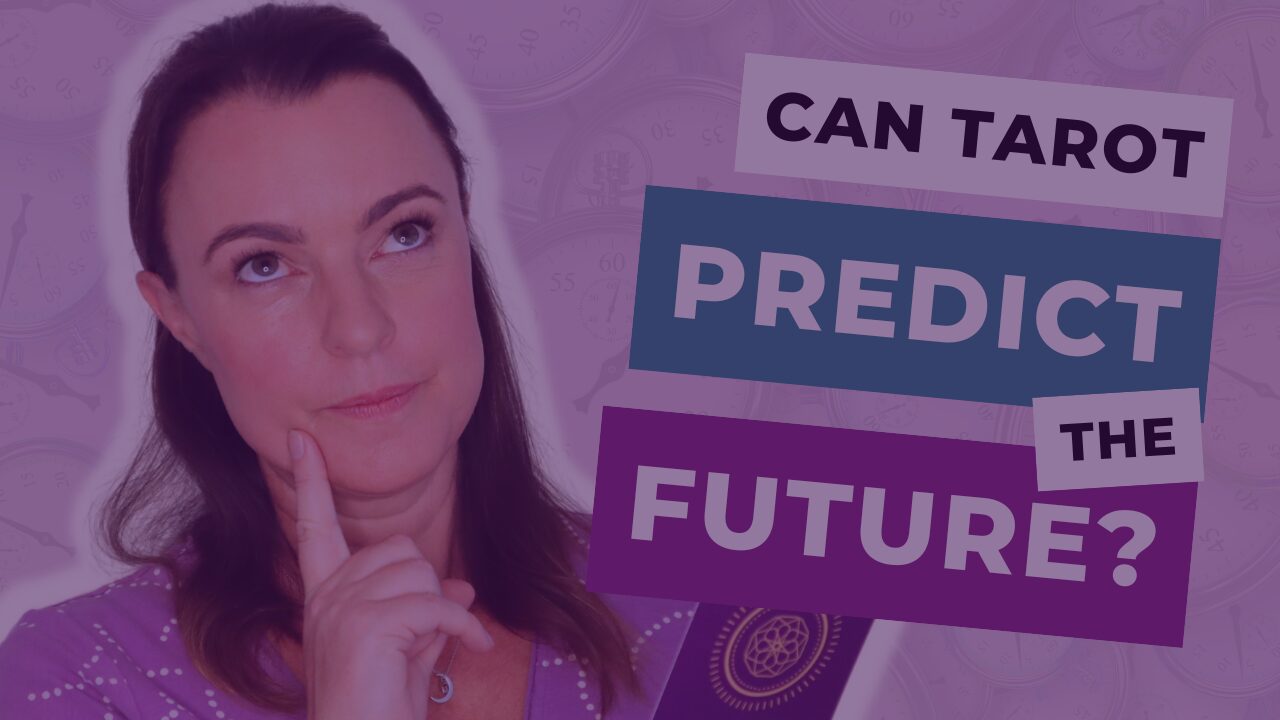
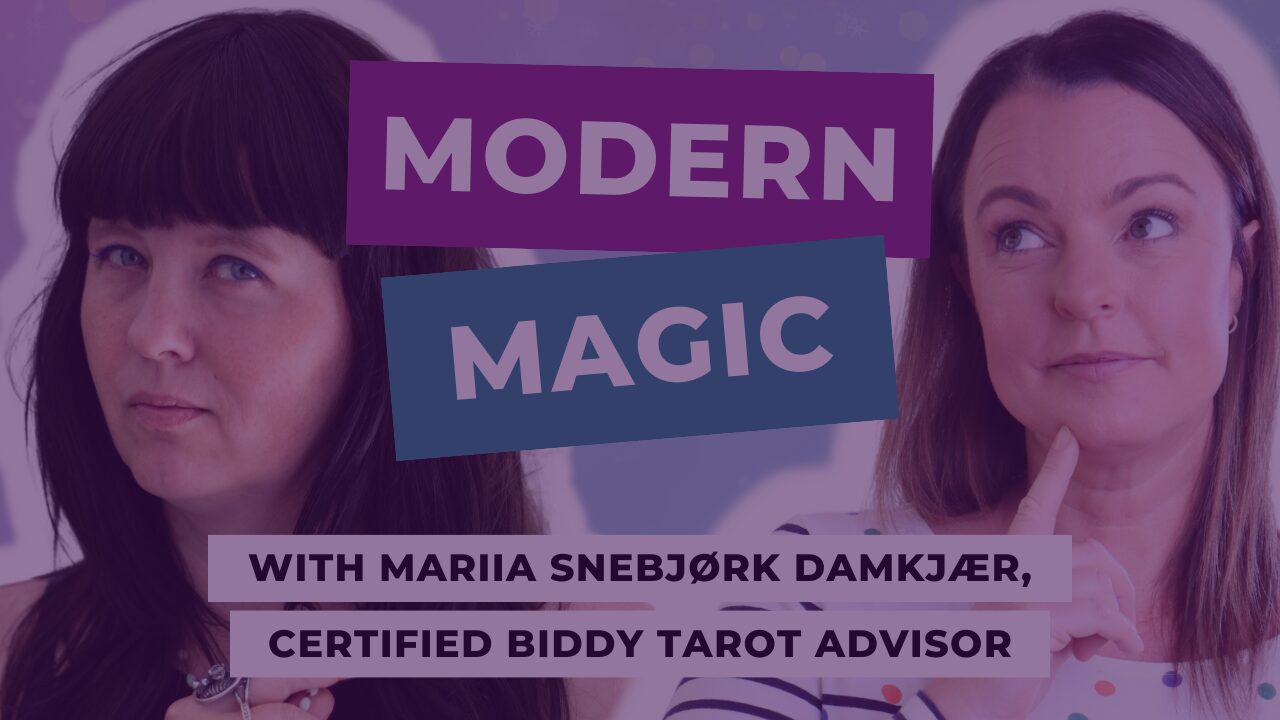
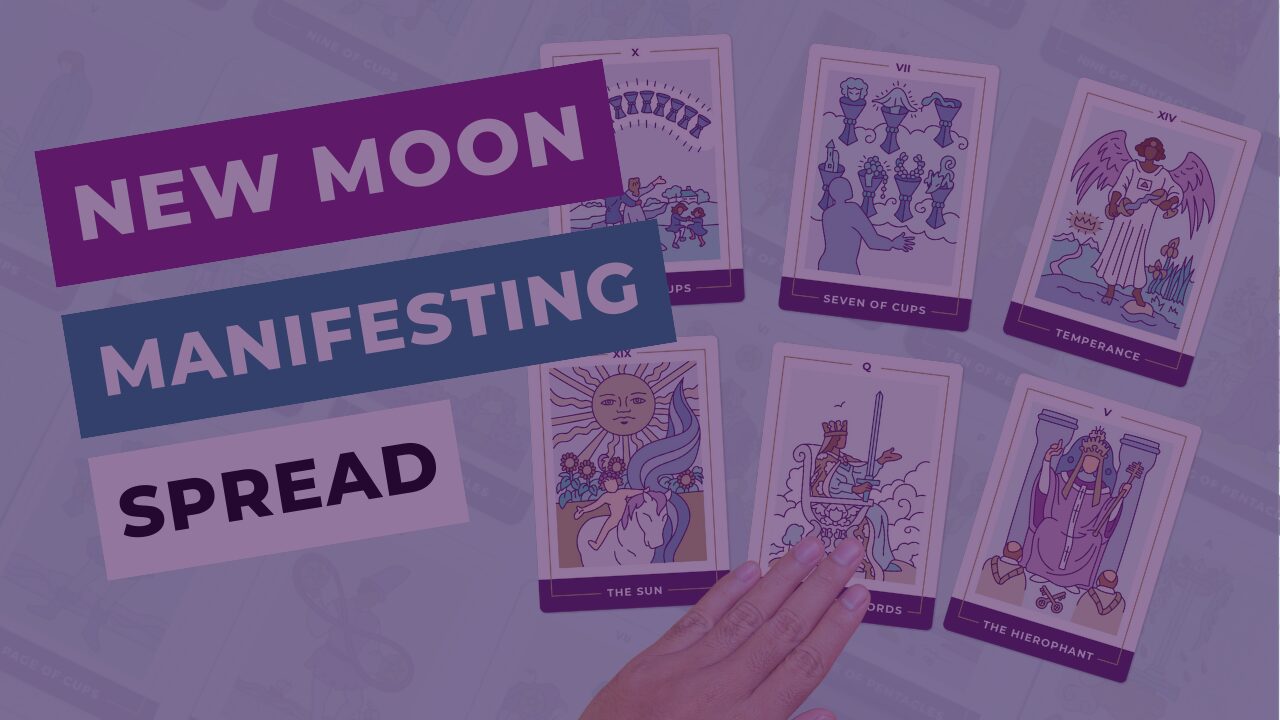
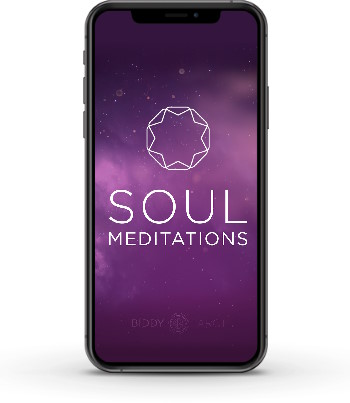 Harness the wisdom of the Major Arcana with 22 guided meditations. Here’s what you’ll get:
Harness the wisdom of the Major Arcana with 22 guided meditations. Here’s what you’ll get: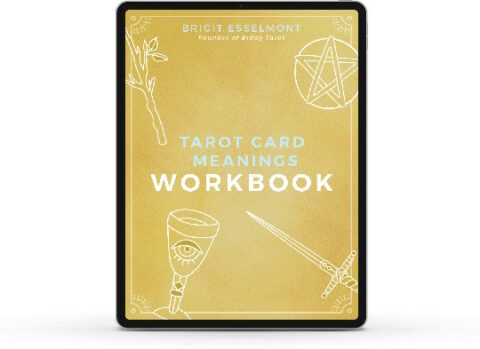 Create a deeply intuitive and personal connection to the Tarot cards with your very own Tarot Card Meanings Workbook. Here’s what you’ll find inside the workbook:
Create a deeply intuitive and personal connection to the Tarot cards with your very own Tarot Card Meanings Workbook. Here’s what you’ll find inside the workbook: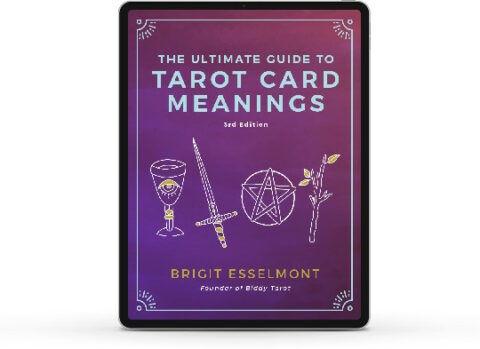 Here’s what you’ll find inside for every card in the deck:
Here’s what you’ll find inside for every card in the deck: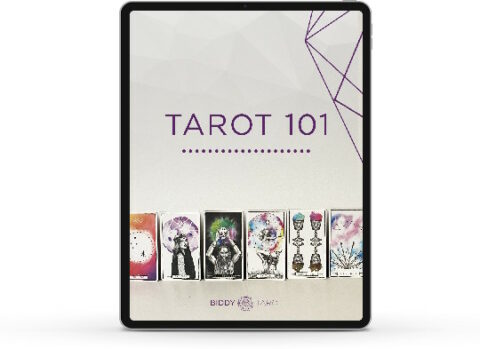 Start doing deep, accurate readings TODAY with this step-by-step accelerated program for beginners.
Start doing deep, accurate readings TODAY with this step-by-step accelerated program for beginners.